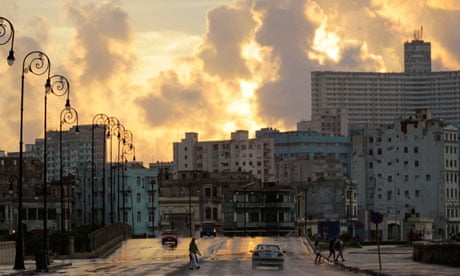It was supposed to be the start of a brave new world in which the customer was king. But the teenage boy in the barber's chair stared at his reflection, aghast and almost crying. "What have you done?" he asked, caressing uneven clumps on a shorn scalp.
The barber, a fortysomething man with a grubby white coat, put down the scissors, lit a cigarette, and shrugged. "Looks OK to me. Don't know what you're on about."
The young customer examined his head from different angles, each worse than the last. "It's like …" – he struggled for words – "a tennis ball. A bald bloody tennis ball." The barber took another drag and put out his hand. "Forty pesos. Have a nice day."
The scene on Neptuno street, a crumbling, sun-bleached quarter near downtown Havana, was a taste of Cuba's challenge in transforming its socialist economy with a sweeping privatisation drive.
Authorities announced yesterday they will lay off more than 1 million state employees in the island's biggest economic shake-up since the 1960s. Cuts begin immediately, with 500,000 jobs due to go by March. Loosened controls on private enterprise will, it is hoped, jumpstart the private sector and turn former public workers into entrepreneurs.
"Our state cannot and should not continue maintaining companies, productive entities, services and budgeted sectors with bloated payrolls [and] losses that hurt the economy," said the official Cuban labour federation, which announced the news.
"Job options will be increased and broadened with new forms of non-state employment, among them leasing land, co-operatives and self-employment, absorbing hundreds of thousands of workers in the coming years," it said.
In fact, the changes started in April with a pilot scheme to privatise barbers and hairdressers. Formerly state employees – about 85% of the labour force works for the communist state – they were told to take over their own salons, charge whatever they wanted, pay tax – and court customers.
As the barber showed, providing good customer service, let alone expanding market share, is an alien concept to many accustomed to receiving the same pittance wage regardless of job performance. "I don't want to take over this place," Luis, the barber, who preferred not to give his surname, told the Guardian. "How do I know it'll make a profit? How do I pay suppliers?"
Like it or not, those are questions many more Cubans will soon be asking after receiving their pink slips. The authorities, according to a 26-page party document leaked to the Associated Press, have a plan for them to raise rabbits, paint buildings, make bricks, collect garbage and pilot ferries across Havana's bay.
Some of those let go will be urged to form private co-operatives, others will be directed towards foreign-run companies and joint ventures, and others will be encouraged to set up their own small businesses.
The Communist party document admitted lack of experience, insufficient skill levels and low initiative could sink new enterprises. "Many of them could fail within a year," it says.
After half a century of official certitude about being its socialist course, Cuba is entering new waters. Its final destination remains unclear. "A hybrid is evolving which can't be said to be any one thing," said Julia Sweig, a Cuba expert at the Council on Foreign Relations thinktank. "We're seeing a uniquely Cuban transition but within the global economy."
Unemployment last year was officially 1.7%, but with average monthly salaries of only $20, supplemented by a ration book and free health care and education, many Cubans make minimal efforts, prompting an old joke: "They pretend to pay us and we pretend to work." Che Guevara's dream of creating a "socialist man" motivated by moral rather than material incentives has long been abandoned.
This week's announcement – widely reported across state media – has been trailed since Raul Castro succeeded his brother Fidel as president in 2008. "We have to erase forever the notion that Cuba is the only country in the world in which people can live without working," he told the national assembly last month. The decades-old US embargo – a crippling, punitive measure – could no longer be blamed for all the island's woes, he said.
It was no longer possible to protect and subsidise salaries on an unlimited basis and cuts will affect all government sectors, said the labour federation. "Losses that hurt our economy are ultimately counterproductive, creating bad habits and distorting worker conduct."
Workers at the ministries of sugar, public health, tourism and agriculture will be let go first, according to the Communist party document. The last in line will be those at civil aviation and the ministries of foreign relations and social services.
To ease the pain, authorities hope to energise the stunted private sector by encouraging Cubans to raise animals, grow vegetables, drive taxis, repair vehicles, make sweets and dried fruit and seek building work.
Leftwingers abroad may feel let down by the cuts, but Cuban officials believe the thriving black market is an indicator that the private sector will soak up surplus labour. Such consensus would contrast with Britain, Ireland and Greece, among others, where cutbacks have triggered vocal protests.
One Havana-based western diplomat was less sanguine about Cuba's response, especially as there were simultaneous cuts in subsidies for food, cigarettes and other products which people used to barter. "People knew this was coming, but now it's here, it's real, and they're worried. Bosses will get rid of the least productive employees, the ones who don't work or show up for work. The type of people who may lack the get up and go to start a business. People wonder if there will be a rise in crime, or social protests."
Europe was enduring its own economic travails but was at least accustomed to unemployment, said the diplomat. "People here aren't used to being threatened with losing their job. They may complain their salary is only $15 a month, but that's $15 more than nothing."





